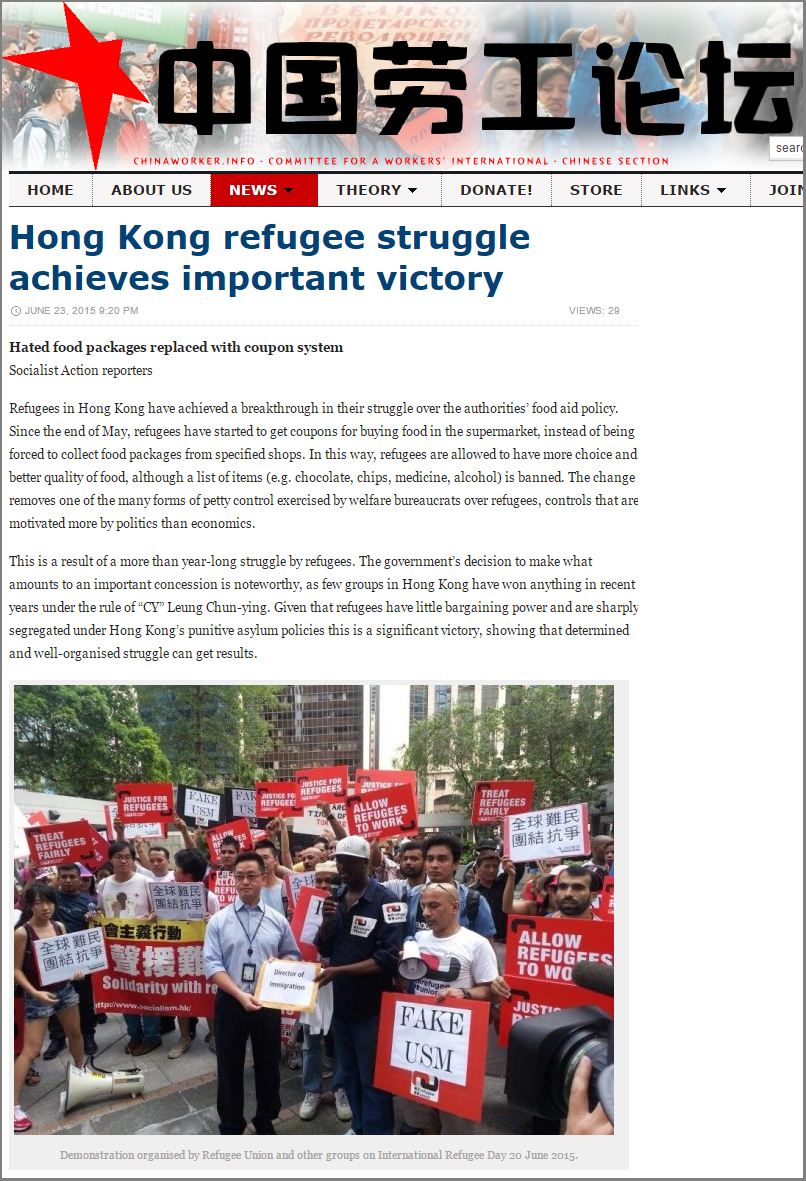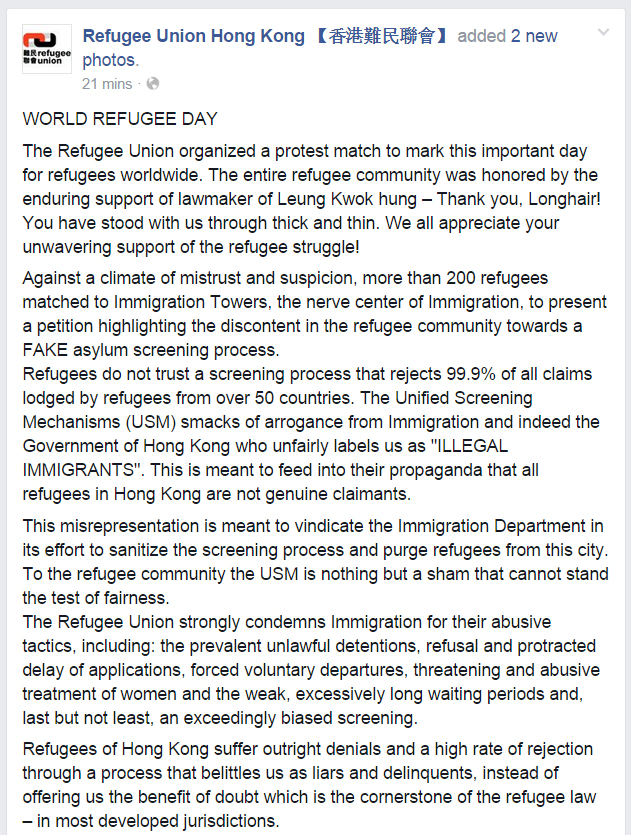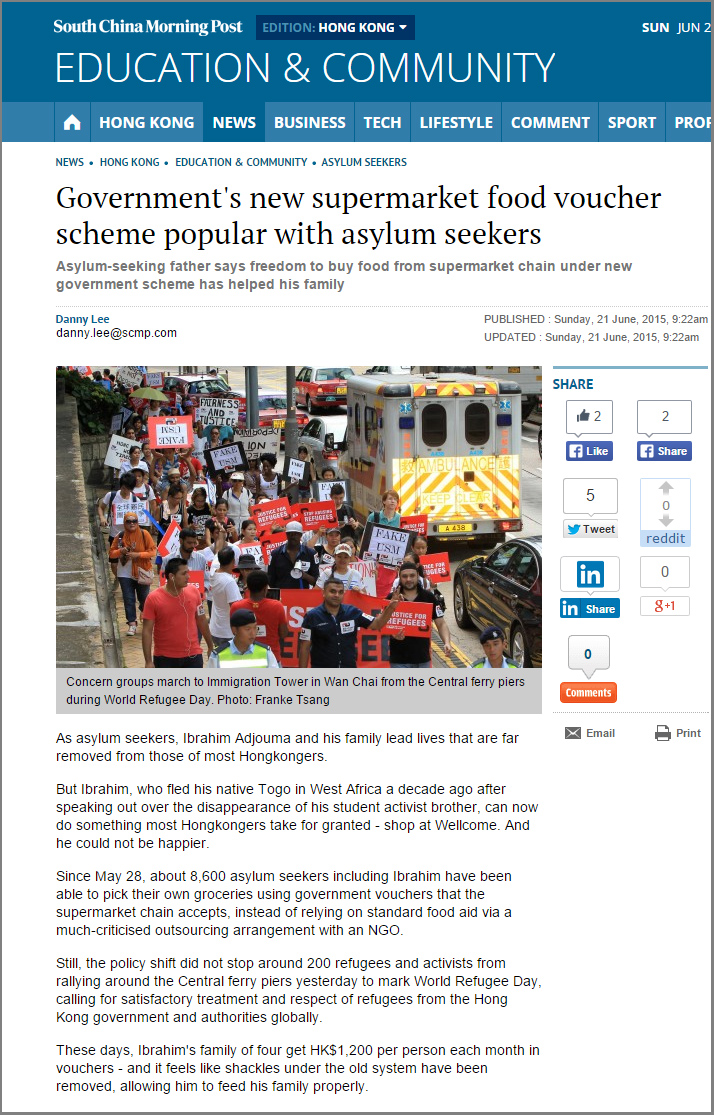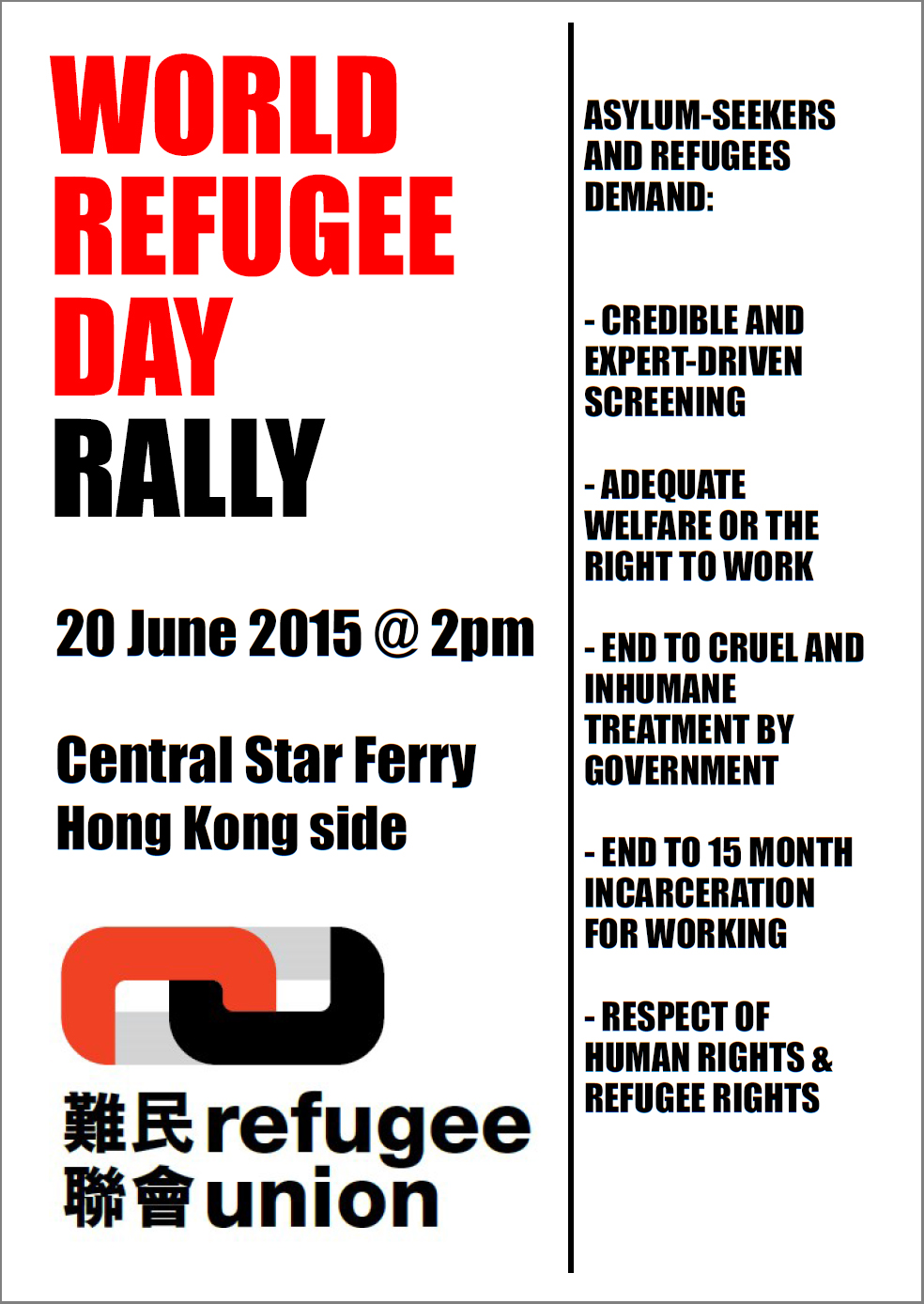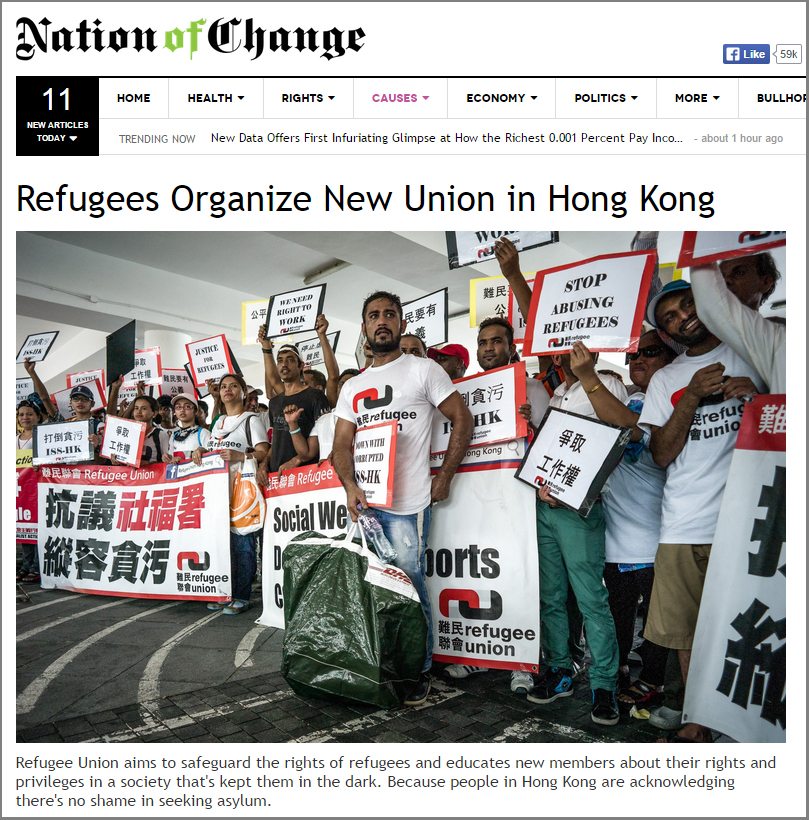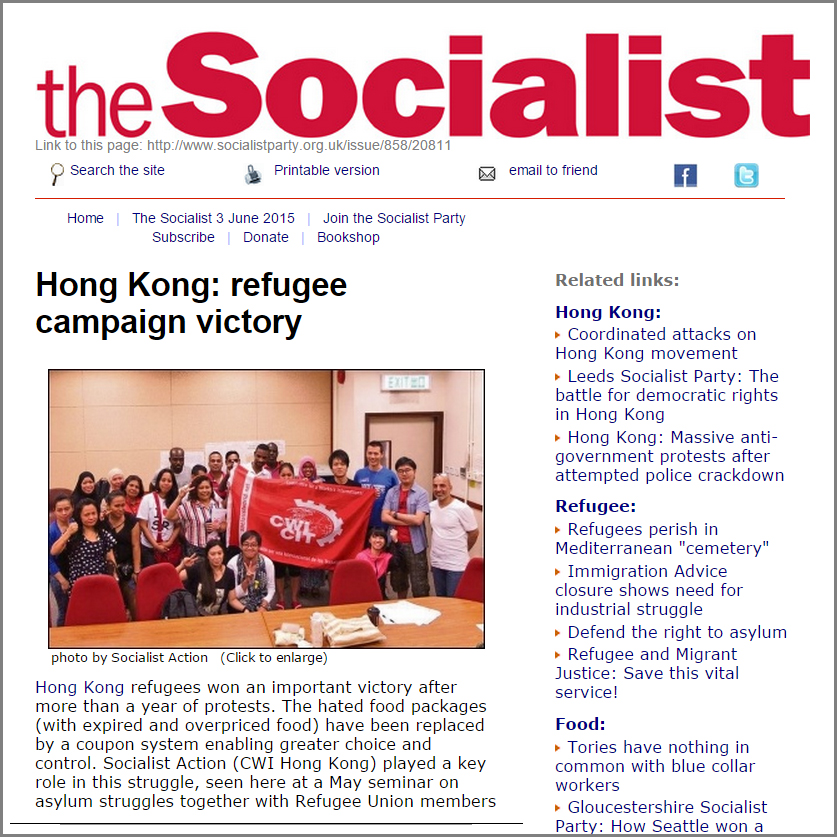USM is a mechanism of border control not refugee protection
Jul 2nd, 2015 | Advocacy, Immigration, Rejection, VF Opinion | Comment
In view of the very low acceptance rate of the Unified Screening Mechanism (USM), perhaps it is necessary to rethink the purpose of this mechanism. Vision First suggests that at the Legislative Council’s Panel on Security on 7 July 2015, lawmakers re-examine the implementation of the USM and its usefulness to taxpayer who this year will foot a 644 million dollar bill to operate what refugees dubbed a ‘fake’ scheme.
Given that the Government bluntly refuses to grant asylum and brands refugees as illegal immigrants, what rational and objectives have supported Hong Kong’s asylum process since 1992? The city’s masterminds are too savvy to operate exclusively on the premise of moral obligations towards the international refugee problem, as states are rarely motivated by moral responsibility alone.
The USM seems to be characterized by its migration control function, rather than the Government’s international duty to safeguard persecuted foreigners. Like its predecessors, the USM does not offer sanctuary. Rather it exerts state power to confine, control and ultimately expel an unwanted migrant population.
Government propaganda successfully homogenized refugees with economic migrants, illegal immigrants and travelling outcasts stigmatized as a risk to Hong Kong’s security and affluence. Within this self-serving masterplan, the USM is deployed as a MECHANISM OF BORDER CONTROL to relentlessly banish asylum seekers, stateless persons, failed (often pregnant) domestic workers, economic migrants and other misfits perceived as a nuisance after a few years of exploitation.
The Government is less than sincere about even granting non-refoulement protection, or else considerably more than 28 refugees would have been identified and assisted since 1992. Such negligible results indicate that the asylum process has routinely performed the function of rejecting undesirable border-crossers, rather than protecting vulnerable refugees.
Although it is unlikely that pro-establishment lawmakers will question the status quo, and it is improbable that challenges from the opposition will be anything more than noted, Vision First presents a set of questions of public interest for the upcoming Legislative Council’s Panel on Security meeting:
- How many claims were substantiated since the launch of USM? And how many claimants currently enjoy non-refoulement in Hong Kong (including CAT)? Please specify the ratio between substantiated claims and outstanding claims and whether successful cases were Torture, CIDTP or Persecution? (VF bets they were all Persecution to expel them from Hong Kong via the UNHCR)
- When will the USM be amended to include assessment of Bill of Right Art. 2 “Right to Life” claims?
- Why are USM claimants not allowed to work in Hong Kong despite living in destitution?
- What evidence can the Security Bureau provide that allowing asylum seekers to work would lead to a massive influx of new arrivals into Hong Kong?
- Why are USM claimants arrested for working illegally and given longer jail sentences compared with visitors and/or overstayers?
- Some local NGOs claim that the level of welfare assistance given to USM claimants is too low for individuals to subsist, making it necessary for them to work illegally in the city. What’s the Bureau’s response to this claim?
- Some lawyers confirm that most of their clients do not receive sufficient funds, or financial assistance in kind, or food to meet their basic needs as rents have increased and inflation has outstripped what amounts the SWD provides. This leaves them with no choice but to beg and frequently resort to working illegally. Is it not a fact that the increase in rents has outstripped the rental assistance provided to claimants?
- Do you agree that thousands of asylum seekers lived for years, and hundreds continue to live, in abandoned chicken and pig farms sanctioned by the government as these were/are the only locations affordable based on government rent assistance?
- Do you agree that such pig and chicken farms are not zoned for residential living? Is the government investigating why this happened and who is responsible for distributing public money to pay for illegal structures?
- Will anyone be prosecuted for allowing dozens of refugee slums to develop and operate on funds paid from the public purse between 2006 and 2015?
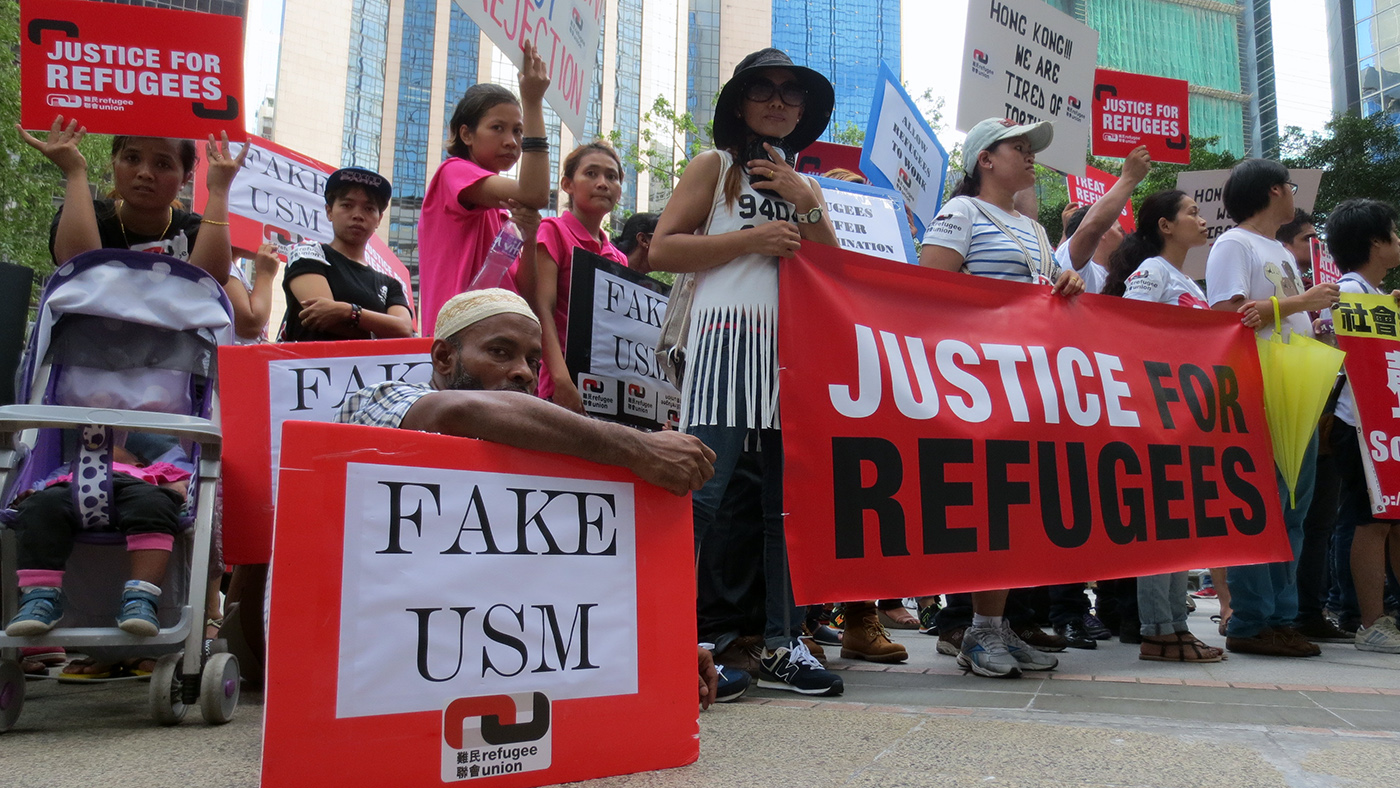
Hong Kong refugee struggle achieves important victory
Jun 24th, 2015 | Advocacy, Food, Refugee Community, Welfare | Comment
Refugee Union reports on World Refugee Day rally
Jun 23rd, 2015 | Advocacy, Immigration, Refugee Community, Rejection | Comment
New supermarket food voucher scheme popular with asylum seekers
Jun 21st, 2015 | Advocacy, Food, Media, Personal Experiences, Welfare | Comment
Immigration steps down removal process of refugee
Jun 15th, 2015 | Advocacy, Immigration, Legal, Rejection | Comment
An extraordinary effort by the Vision First pro bono legal team secured a significant success against the immigration machinery that processes, rejects and finally removes 99.9% of refugees who have the misfortune of seeking the protection of the Hong Kong Government.
The operation to secure the liberty of Mr. A (who cannot be named for legal reasons), a South Asian refugee who arrived in Hong Kong in 2014, commenced on 6 May 2015 when Barrister Mark Sutherland and solicitor Tam Kam Tong met him at a legal visit at the Castle Peak Bay Immigration Centre (CIC). On the same day, a request was made to the Immigration Removal Assessment Section (RAS) for his immediate release on the grounds that his detention was arbitrary and unlawful.
It transpired that Mr. A had been detained throughout the entirety of the process of assessment of his first tier non-refoulement claim a process which took more than four months. Vision First has previously commented on the Director of Immigration’s apparent disregard for the judgment in Ghulam Rbani v Secretary for Justice for and on behalf of the Director of Immigration [2014] 17 HKCFAR 138, which requires the Director to act expeditiously in releasing a refugee once a claim has been filed. Vision First is not persuaded that four months in Mr. A’s case can be said to be an expeditious move towards release on any reading. See our blog: Legal visit exposes apparent abuse in immigration detention centre.
The later refusal of Mr. A’s claim was inevitable in view of the Government’s rejection of virtually all first tier claims.
To pour salt on the wounds, the Appeal mechanism worked against Mr. A before it even got off the ground. His first tier lawyer provided by The Duty Lawyer Service told him “I will not help you on your appeal.” Mr. A was therefore left stranded to fight his own appeal. Vision First poses the rhetorical question: “How can this meet the high standards of fairness prescribed by the Court of Final Appeal circa ten years ago in Secretary for Security v Sakthevel Prabakar [2005] 1 HLKRD 289?”
Although the facts that compelled Mr. A to claim asylum are not yet known in detail, and might or might not be meritorious, that a lawyer was not assigned to his appeal prejudiced the high standards of fairness required for the determination of his claims. Barrister Sutherland observed, “It is an issue of real justice. The first instance lawyer refused to assist and a second opinion on merits was not apparently provided. It was not a level playing field. The refugee was ambushed by the appeal process without any chance of success. This case might expose a troubling lacuna in the Unified Screening Mechanism.”
The complex process that led to Mr. A’s release tried the skills and determination of his lawyers. The Director of Immigration, Mr. K.K. Chan did not consider the grounds put forward for his release and instead scheduled his removal on a flight out of Hong Kong on 11 June 2015. The morning before, Mr. A. called Arif of the Refugee Union pleading for an urgent intervention. Time was of the essence, because he was scheduled to be taken to the airport the following day.
In the morning of 11 June 2015, the legal team comprising Barrister Sutherland and solicitor Tam, acting on a pro bono basis, made an urgent application for a writ of habeas corpus ad subjiciendum, coupled with an application for stay of execution of the removal order.
An ex parte hearing on notice was set for that afternoon at which Mr. Sutherland submitted to the Hon. Judge Chow that Mr. A could not be removed because he had not exhausted his legal remedies. These included an application for leave for a judicial review of his asylum claim rejection, as well as a damages claim for unlawful detention, not to mention an appeal against the refusal of legal aid.
The application was won by the Director of Immigration, who was represented at the hearing, despite the first-tier Notice of Decision and the Appeal Decision not having been made available in Court. This was against the backdrop of requests made to the Director of Immigration and The Duty Lawyer Service to produce all the documents pertaining to this case, all of which remain unanswered.
A message from a Refugee Union member later circulated on social media, “This calls for the Union to have heart. I saw our lawyer and barrister sweating on behalf of the refugee and I felt like collapsing due to the Immigration lawyer was insisting on removal. I saw people who don’t have empathy at all. Anyway we need to push forward.” Her disappointment was certainly shared by her colleagues.
After the hearing, the Immigration officers and Department of Justice Counsel Mr. Lawrance Chan were clearly pleased with the result, as evidenced by their smiling faces.
After the Court hearing, Solicitor Tam and Arif rushed to the airport to seek urgent instructions, but Mr. A was nowhere to be found. Both Immigration and the Police could not shed any light on his whereabouts.
Early the following day Barrister Sutherland recalls, “I personally telephoned CIC to ascertain Mr. A’s whereabouts and to notify Immigration Officer Mr. S.K. Wong that an urgent legal visit had been requested for later that day. To this, Mr. Wong, whilst confirming that Mr. A was at CIC, sounded surprised and replied, ‘You had better be quick because we are taking him to the airport tonight’”.
In the afternoon of 12 June 2015, the legal team met a visibly shaken Mr. A in CIC. He was afraid of being deported. It is likely that CIC officers had informed him about the High Court failure, at which he was not present despite the requirement for authorities to “produce the body” in habeas corpus proceedings, which is Latin for “you [shall] have the body”. It became apparent that the next few hours would be crucial as the Director of Immigration, Mr. K.K. Chan decides to either remove or release the refugee.
Mr. A’s “Right to Life” claim under Article 2 of the Bill of Rights had since been filed and the Director of Immigration warned not to remove him due to this further legal impediment.
At 6pm a triumphant Barrister Sutherland reported, “There is a new term in the asylum vocabulary. The Director of Immigration decided to STEP DOWN the removal procedures. Mr. A’s “Right to Life” application was accepted and tonight he will be moved to Ma Tau Kok (Immigration office). I expect he will be released very soon. The removal was successfully stopped at the eleventh hour.”
Later that evening Arif of the Refugee Union received an unexpected phone call from Ma Tau Kok. Arif reported, “Mr. A just called me from Ma Tau Kok. He could not contain his happiness. What a difference a day can make! This morning he was desperate because he was sure he would be deported. Tonight he couldn’t be happier because he is still in Hong Kong. He is so thankful for those who fight so hard for him.”
Vision First is pleased to report that Mr. A was released from detention on Saturday, 13 June 2015. It is now our tum to smile.
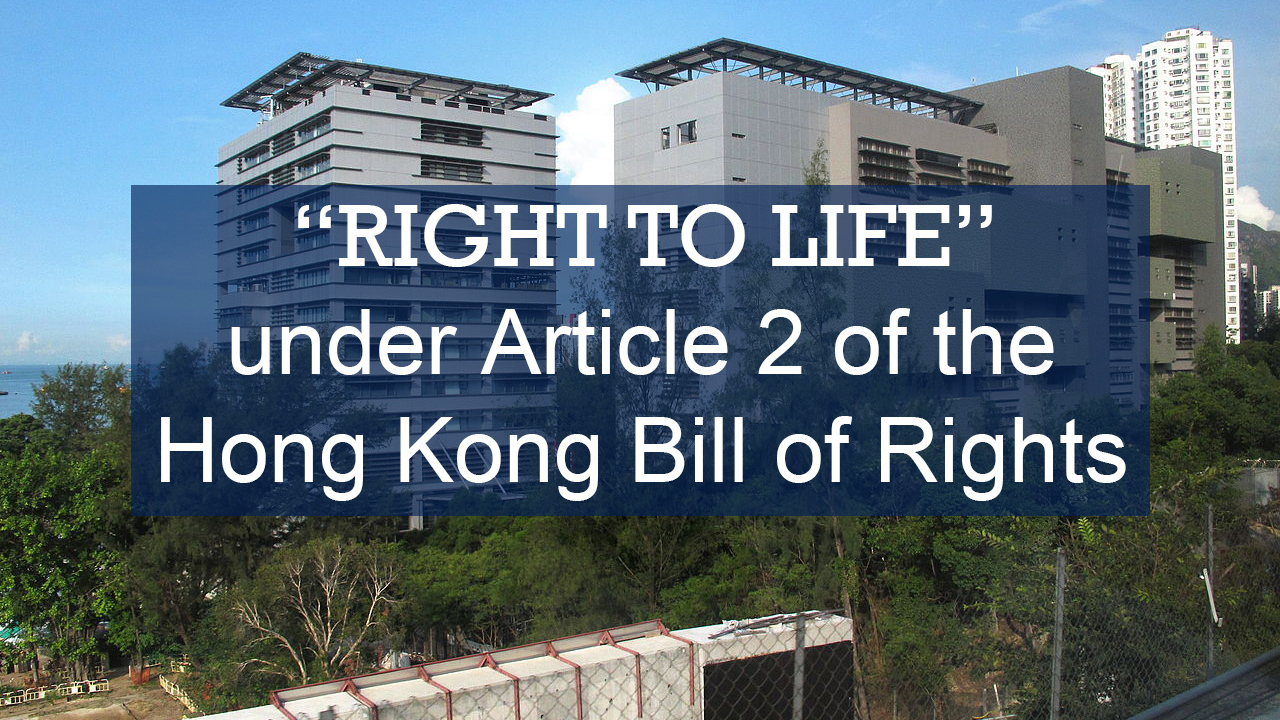
Does the war on welfare and refugees also target minors?
Jun 8th, 2015 | Advocacy | Comment
The asylum conundrum in Hong Kong is believed to be caused by individuals fleeing impoverished countries to seek greener pastures in Hong Kong. They are said to challenge border security and our government’s authority to undeservedly claim benefits that ought to be reserved for resident poor.
Although there might be individuals abusing the asylum system, who is responsible for the systemic failure to keep up with global challenges? There was recently great media uproar over a 12 year-old undocumented Chinese boy who was mercilessly hounded by xenophobic, localist groups into self-deportation – or what is euphemistically known to refugees as ‘voluntary departure’.
The pressure groups involved harassed the boy in a hateful witch-hunt as a warning to prospective migrants who might consider following in his footsteps. But hold that thought for a moment – doesn’t such bigotry conveniently overlook the 1.5 million Chinese migrants who fled to Hong Kong in past decades?
Protesters were quoted by the SCMP as saying, “We have to ‘kill one to warn 100’ who are abusing loopholes in the system.” But who is at fault for the existence of such loopholes? Are migrants to be blamed for leveraging limited resources and options, or should public opinion blame the architects of our flawed system?
The story of this undocumented boy resonates with another undocumented, unaccompanied minor recently encountered by Vision First. This gentle and soft-spoken youngster narrated a perilous odyssey through unfamiliar lands across Vietnam and China to Hong Kong. He was locked in a shipping container like livestock sent to the slaughter house.
His journey ended when his handler abandoned him, trusting and hopeful, in Sham Shui Po with the reassuring words, “Wait here that I go buy some food.” That was the last time he saw a familiar face. The person he had trusted with his life then vanished. Lonely in a teeming crowd, hungry before displays of abundance, he was homesick and desperate. “What will happen to me now?” he fearfully wondered.
Misha, not his real name, was eventually assisted by co-nationals who, similarly to him, found hardship and misery, not the protection and security they sought in our city. The 17 year-old boy struggled against an asylum and welfare system that regrettably failed to recognize his deep vulnerability.
For the past few months tried to receive assistance from the Social Welfare Department after his application for USM protection was lodged on 20 April 2015. Misha however was told by a SWD social worker that first his identity had to be confirmed with the Immigration Department, before he became eligible for assistance.
And yet Misha had already received his Immigration recognizance papers on 16 April 2015. If the SWD computers are not connected to Immigration’s database, then surely an urgent phone call should be made when a homeless minor calls for emergency assistance.
The fact is that almost two months later Misha remains de facto homeless. Vision First often encounter similar problems. The data of refugees who lodged applications for asylum is not promptly accessible by other departments for them to become eligible for assistance. Instead they are made to wait homeless and in desperate need of protection, despite some of them being minors or having children.
Vision First cannot but query who is responsible for such mistreatment of vulnerable refugees. Is it malpractice, indifference, or downright incompetence? Or is it a systematic, intentional form of low-level state violence perpetrated to appease xenophobic groups and perpetuate fears of an unsubstantiated floodgate scenario?
It is a black day for Hong Kong when the state flexes its muscle against children and minors.
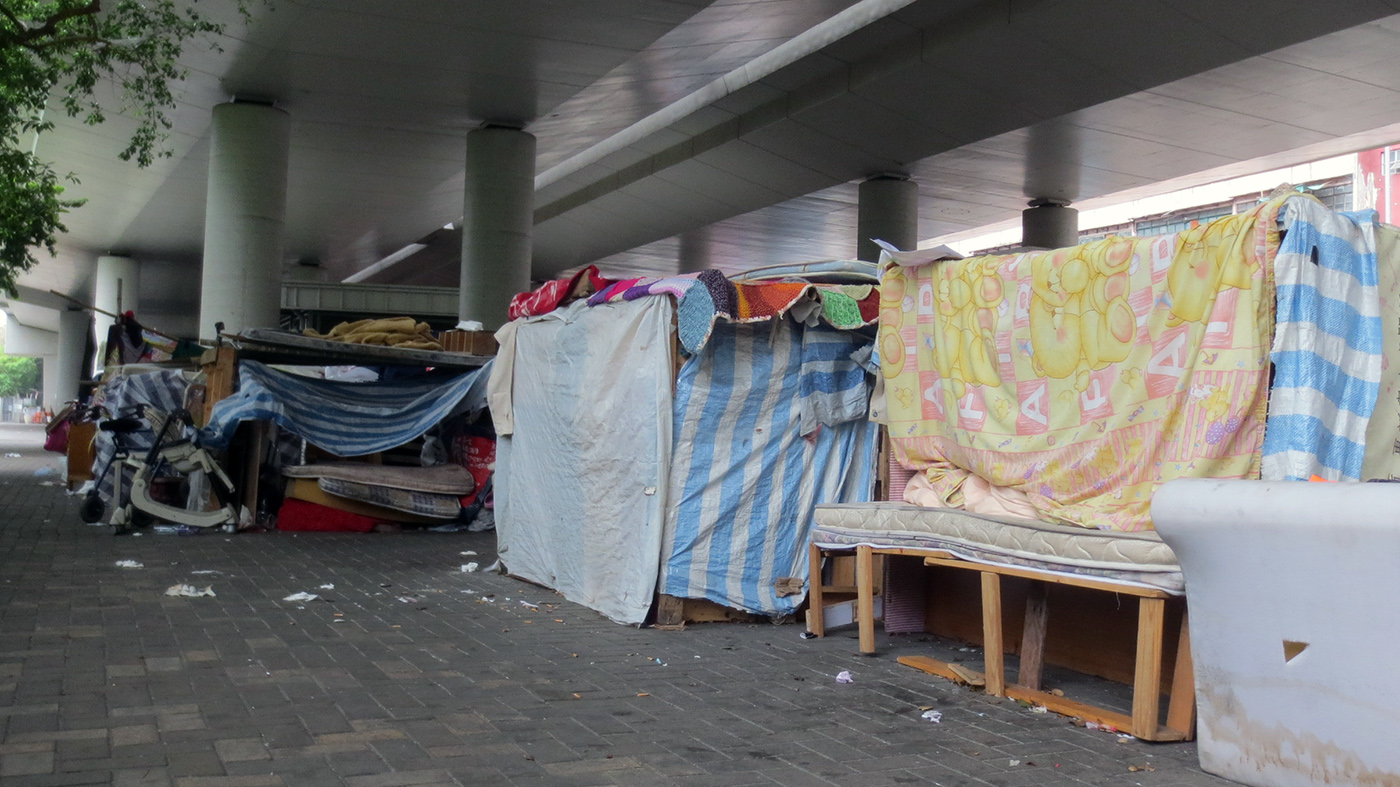
Nation of Change (USA): Refugees Organize New Union in Hong Kong
Jun 4th, 2015 | Advocacy, Media, Refugee Community, Welfare | Comment
The Socialist (UK): Hong Kong refugee campaign victory
Jun 4th, 2015 | Advocacy, Media, Refugee Community, Welfare | Comment
The cardboard box community of Sham Shui Po
Apr 21st, 2015 | Advocacy, Housing, VF Opinion, Welfare | Comment
A fire broke out on a remarkable foot bridge over four-lane Yen Chow Street West in Sham Shui Po on the night of 19 April 2015. This pedestrian crossings was home to over a dozen homeless persons who lived in semi-permanent huts made of plywood, cardboard and plastic sheets. Some had lived there for years.
News of the fire spread quickly among refugees who three times a month join a local charity, which prefers to remain anonymous, to distribute food to this homeless community comprising mostly elderly and troubled residents. This humanitarian service has brought refugees closer to impoverished residents who suffer similar neglect and deprivation in our affluent city.
While firefighters doused the flames, several concern groups rushed to offer assistance and speak about the shameful conditions endured by several hundred vulnerable persons in the neighbourhood. A Refugee Union member later observed, “NGO people should coordinate efforts to advocate for badly needed changes … better welfare and proper homes is what these people need … Isn’t the government ashamed how people suffer in the streets?”
After the fire, a passive-reactive government did what it does best – lock the stable doors after the horse has bolted. Drawing parallels with the fires that brought death and destruction to refugee slums, the Fire Service Department clamped down on the homeless people living on that food bridge with little concern where they would end up sleeping – possibly under a different flyover.
An NGO worker familiar with the area reported that there are over 60 Vietnamese refugees living in cardboard huts under that section of the West Kowloon Corridor. A long row of huts adjacent to the Tung Chau Street Park offers a sheltered space for sleeping and storage. These shacks are apparently tolerated by the authorities on the hidden side of the wet market where they are less likely to offend the public conscience.
It is understood that the refugees living there collect groceries at the ISS-HK appointed shops and cook with gas stoves on the pavement. There is no electricity for refrigerators. These refugees are unable to rent rooms for the 1500$ allowance and lack the organizational skills to request better assistance. They might strengthen statistics presented to the Social Welfare Department that encompass refugees who collect food rations, but seemingly do not require rent assistance.
Vision First will partner with Refugee Union to plan a Vietnamese language drive to reach out to this most marginalized and uninformed sub-group said to comprise veterans who have been in Hong Kong for twenty years as well as newcomers who arrived within the last year.
The plight of the homeless ought to be a concern for all citizens privileged to sleep under a proper roof. The human suffering caused by ineffective policies ought to resonate with everyone as we wonder why government and community are failing the most vulnerable in society, citizens and foreigners alike.
“Tonight we will gather to serve the homeless again,” remarked a refugee mother, “There are people suffering worse than us and this (community service) opened my eyes. I cannot work, but I can help other needy people. This is very meaningful for me. At the end of the day we are the suffering people … It doesn’t matter the colour of our skin or where we come from.”


